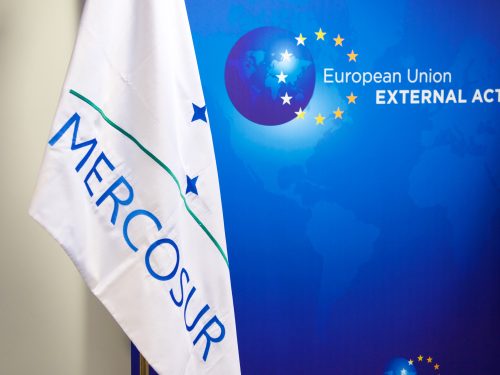News
Share on
The Director General of Confindustria, Raffaele Langella, spoke in hearing informal meeting on the modalities of cooperation between Italy and the African continent at the 3rd Foreign Affairs Commission of the Chamber of Deputies.
L'Africa is a key continent in the international geopolitical and economic scenario and Italy, particularly through its industrial system, can play a leading role in fostering its growth. In 2023, the average growth of the gross domestic product (GDP) royal Africa stands at 3.4%, with a slight increase to 3.8% in 2024.
In particular:
- in Central Africa (+4.1% in 2023) political and security challenges persist, particularly in Chad, the Central African Republic and the Democratic Republic of Congo;
- for theEast Africa (+3.4% in 2023) is weighed down by the current conflict in Sudan, along with increasing debt vulnerability and high debt servicing costs in Ethiopia and Kenya, respectively. Growth countries in the region include Rwanda and Tanzania. Aided by major investment initiatives targeting agro-industrialisation, retail, manufacturing, tourism and the energy sector, growth in these countries could rise to 5.1% in 2024;
- in North Africa (+ 4% in 2023) the biggest obstacles are negative terms of trade, shocks, large currency devaluations (in Egypt) and a high inflation environment (particularly in Algeria and Tunisia);
- l'Southern Africa with growth at 1.6% in 2023 is the slowest on the continent. In South Africa, the largest economy in the region, the serious challenges related to electricity have had a particularly marked impact on the productivity of the economy;
- in West Africa, the expected slowdown in Nigeria in 2023 could contribute to a forecast of real GDP growth declining to 2.8% from the May forecast of 3.3%.
With almost two-thirds of its population under the age of 30 and 40% under the age of 14, the continent boasts the world's youngest demographic structure. With the population doubling - 2.8 billion by 2050 - Africa's young and growing consumer market will be the main driver of global demand for consumer products and services, education, health, technology and infrastructure. Moreover, Africa is home to an incredible amount of diverse natural capital: almost 30% of the world's mineral reserves, 12% of the oil and 8% of the natural gas are found in Africa; the continent is home to 40% of the world's gold reserves, 30% of the world's land deposits and 65% of the world's arable land, making it critical for long-term food production and security.
Africa's position is of strategic importance in the trade global: the continent is geographically positioned as a gateway between the Atlantic and the Indian Ocean; secondly, Africa is home to important maritime trade routes; and its proximity to the Suez Canal is a significant advantage, as 12% of world trade passes through this channel every year.
The increased geopolitical competition on the continent, with the entry of new players and the strengthening of the positions of others already present, requires an adjustment of the instruments used so far by our country. Through the public-private coordination it is necessary to facilitate the operation of enterprises Italian companies, especially SMEs, in Africa, not least in view of the key step concerning the establishment of a large continental free trade area (FTAF). The Italian business world's approach to the African continent has changed over time, with an increasing number of companies, associations and institutions starting to look beyond the nearest North Africa.
In 2022 the Italy-Africa trade recorded a value of more than EUR 68 billion. This figure was up sharply from the year before, mainly due to imports from Africa, which almost doubled from EUR 24 billion to EUR 47 billion. The Italian exportswith a predominance of investment goods (mechanics, electrical equipment and pharmaceuticals) reached a record high of EUR 21.3 billion. On the import side, purchases of raw materials, especially energy materials, played a major role, which enhanced the role of supplier countries such as Algeria, Libya, Egypt, in the North African part, and Angola, Mozambique, Gabon, Ghana, Congo, in the part south of the Sahara.
The growing political will to see Africa also as a economic partner, proclaimed in words by many successive governments, must take action in supporting medium-sized Italian companies intrigued by the continent. The African market has been beaten for years by players from all over the world. Competition from companies from all European countries, but also from China, the United States, Turkey, Israel and Brazil is fierce. And many Italian SMEs complain above all of difficulties on the economic-financial side. The absence of large Italian banks from the continent and the prudence with which SACE categorises most African countries makes it more difficult for SMEs to operate. On this front too, something has moved in recent years, but not enough.
It is necessary to develop a Sistema Italia (Banks, CDP, SIMEST and SACE) capable of facilitating the arrival of more Italian medium-sized companies in Africa, which could also drive many SMEs both for the export of machinery, plants, but also for the transfer of know-how and training of local labour.
In this context, a prominent role must be found in the definition of G2G agreements (Government-to-Government) with those countries deemed strategic and presenting the greatest opportunities towards which to direct the implementation of industrial investment projects involving a 'gift' loan for training, capacity building and technical assistance components with a direct impact on local content skills.
We appreciate the Italian government's vision for Africa by promoting, with the adoption of the "Mattei Plan"an innovative model that relaunches collaboration with countries on the African continent and the strengthening of stable, long-term industrial partnerships. A strategic approach to the African continent and related issues, which is certainly not limited to the migration issue.
In this context, Confindustria is ready to provide contributions to identify the projects that our entrepreneurs already have in the pipeline towards the continent, in order to steer them more and more to invest in Africa. It is therefore necessary to facilitate the private sector as much as possible so that it can contribute in creating sustainable development, in line with the continent's interests, and in line with business objectives to grow abroad, strengthening the role of Italian companies. The Italian government's action, through G2G agreements, will be crucial in fostering the conditions and limiting the risks of economic action.




